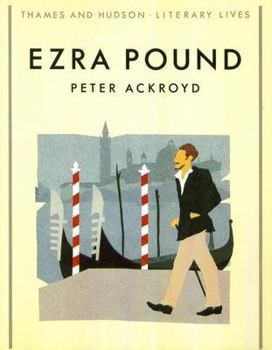Ezra Pound
Select Format
Select Condition 
Book Overview
Presents the life and discusses the works of the controversial and influential American poet and critic. This description may be from another edition of this product.
Format:Paperback
Language:English
ISBN:0500260257
ISBN13:9780500260258
Release Date:January 1987
Publisher:Thames & Hudson
Length:127 Pages
Weight:0.62 lbs.
Dimensions:0.3" x 7.1" x 9.1"
Customer Reviews
1 rating
helpful
Published by Thriftbooks.com User , 22 years ago
Let's face it, few of us are likely to hack our way through the thickets (some of them rendered in Chinese) of Ezra Pound's Cantos. Even in college, in a course onmodern literature, we didn't actually read the Cantos, instead we read Hugh Kenner's book, The Pound Era. Still, one would like to understand what madePound such an important figure in the history of literature and Peter Ackroyd's slender and copiously illustrated biography accomplishes the task quite painlessly.Besides helping us to understand what Pound was trying to achieve in his own poetry--which seems to have been an attempt to capture all of reality within theconfines of the poetic form--Mr. Ackroyd shows how profoundly Pound influenced other Modernists, in particular T. S. Eliot and James Joyce. I'd notpreviously been aware of the degree to which Pound helped sculpt The Waste Land, to the point that Mr. Ackroyd gives him credit as its virtual co-author : The transformation of The Waste Land effected by Pound is, although not total, nevertheless remarkable. What had been a longer, more sustained and more elaborately lyrical work was changed into something less personal, tighter and more abrupt. It was precisely these qualities which were to lend the poem its air of modernity--since, in large part, our notion of what is "modern" is derived from Pound's work and criticism. Where Joyce was concerned, Pound appears to have been one of his earliest proselytizers, publishing Portrait of the Artist in serial form in his magazine, TheEgoist, and Ulysses in the magazine, The Little Review. He also reviewed Joyce's work in every publication he could, extolling his virtues to anyone who wouldlisten. Yet, Pound also had the brutal honesty to assess Finnegan's Wake with the dismissal that it so richly deserved : Nothing short of divine vision or a new cure for the clapp can possibly be worth all the circumambient peripherization. Unfortunately for Pound, the harshness of that critique reveals a willingness to speak his mind and a forcefulness of opinion which were to get him inconsiderable trouble when they combined with other personality traits to turn him into a Fascist propagandist. Mr. Ackroyd convincingly locates the appeal of fascism to Pound in the poet's passion for organization and order, his belief in a cultural elite, and his adherenceto the odd economic theory of Social Credit, expounded by a Major C. H. Douglas : Its doctrine states, quite simply, that once money has lost its natural basis in people's needs and aspirations--when, in other words, it has been turned into a commodity merely to be bought and sold--then the nation and its culture sour. Money is a complex measure of man's time and the worth of his labour; when it becomes an anonymous entity to be hoarded and manipulated, all other human and social values shift downward. But there was also a blindingly simple economic point to be made in this connection: the bankers contr






